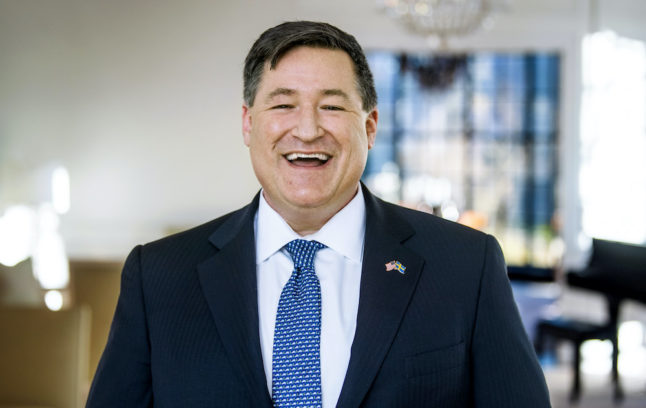When The Local met France’s ambassador Etienne de Gonneville last week, he was preparing to host a viewing party for France’s nail-biting match against Morocco in the World Cup semi finals.
He amused himself during the game by tweeting smiling or frowning portraits of Jean-Baptiste Bernadotte, the French Napoleonic Brigadier-General who ended up becoming King Karl XIV Johan of Sweden.
It was, he said, “definitely one of the main events in the calendar for French people in Sweden”.
— Etienne de GONNEVILLE (@e_de_gonneville) December 18, 2022
King Karl XIV Johan, the French founder of Sweden’s Bernadotte royal dynasty, is not the only Franco-Swedish link de Gonneville likes to draw attention to.
“I was born in Paris, although my family has roots in Brittany, and originally, it’s a family from Normandy,” he says. “So there is a high probability that my ancestors actually came from Scandinavia. Or at least, that’s what we like to think in the family, so [I’m coming] back to my roots in a way.”
Sweden is the 51-year-old’s first posting as ambassador following a 20-year diplomatic career that has taken him to Iran, Vietnam and the US.
Representing the 10,000 or so French people living in Sweden, about two thirds of whom live in and around Stockholm, is a varied role.
“It’s a very dynamic and well-integrated community,” he says about French people working in Sweden. “We do not keep statistics on what French people do in Sweden, but from anecdotal evidence you can see that they are present in every part of Swedish society: from restaurants, of course, to the highest innovative sectors, like gaming in Malmö, or building batteries in Skellefteå, or studying in the various Swedish universities.”
Listen to the interview with the French ambassador on the Sweden in Focus podcast.
Listen & Follow: Apple | Spotify | Google
He describes the trade links between the two countries as “a growing and very dynamic relation… even though we are, for each other, a middle-sized partner.”
The week before the interview, de Gonneville missed the World Cup quarter-final in order to attend the glitzy Nobel Banquet in Stockholm’s City Hall. But he had the satisfaction of sitting next to Judith Gough, the ambassador to the UK, at the awards ceremony, before Les Bleus vanquished the English team, which he joked about on Twitter.
When it comes to trade and investment, de Gonneville sees plenty of room for growth.
“France has a four percent market share, so it’s better than what France does globally, but of course, if you compare us to Germany, Germany is at 18 percent,” he says. “So it shows that there is a huge, huge potential in the relationship, and we are definitely working on it.”
One of the ways that France is seeking to expand its market share is through the strategic partnership for innovation, digitalisation and green solutions signed by France’s President Emmanuel Macron on a visit to Sweden in 2017.
“There is a lot of mutual attraction at the moment between France and Sweden and this is good for both our countries, and this is good for Europe as well,” de Gonneville says.
“We are developing our partnership at the moment on the assumption that there is a certain amount of mutual ignorance and that much more needs to be done to develop our relations. We are working on it and we are very encouraged by the enthusiasm on both sides to do more together.”
Like his Irish and Pakistani counterparts Austin Gormley and Zahoor Ahmed, de Gonneville sees “proximity to nature” as one of the chief draws of living in Sweden. “For those who like that, it’s a huge attraction to the country,” he says.
But in his two years here, he says that what he personally has been most impressed by is “the cohesion in society”.
“It’s a huge strength for Sweden, it has served the country well over time, and we can see in crisis after crisis, political event after political event, how important it is for the resilience of society,” he says.
“There is a saying… attributed to Lenin, that if there was a coup in Sweden and a revolution, the first act of the revolutionary government would be to invite the former members of the bourgeois government to dinner, and I think there’s a lot of truth in that.”
Interview by Paul O’Mahony, write-up by Richard Orange



 Please whitelist us to continue reading.
Please whitelist us to continue reading.
Member comments